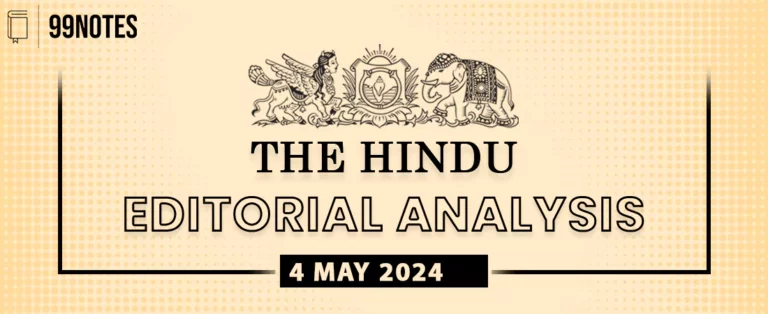6 April 2024 : The Hindu Editorial Notes PDF
The Hindu EDITORIAL
6-April-2024
1. Parliaments past, a mirror to changing dynamics
|
Topic: GS2 – Indian Polity – Parliament. Understanding parliamentary functioning aids in comprehending governance dynamics and accountability mechanisms, crucial for UPSC aspirants. |
| Context |
| ● The article reflects on the performance and trends in the 17th Lok Sabha, highlighting shifts in parliamentary focus, declining interest in national security, and emerging priorities in health and agriculture ministries. |
Introduction:
- The 17th Lok Sabha concluded its proceedings on a Saturday, deviating from its usual schedule, raising questions about historical parallels and expectations for the 18th Lok Sabha.
Performance of Ministries:
- The Prime Minister’s Office faced a surge in questions from Rajya Sabha MPs, but only a fraction were answered, indicating waning interest in seeking answers.
- Ministries of Health and Family, and Agriculture and Farmers’ Welfare emerged as top priorities with the highest number of questions, reflecting evolving interests of elected representatives.
- Conversely, interest in matters of national security and internal affairs declined, with the Ministry of Home Affairs fading from prominence, raising concerns about shifting priorities.
- The Ministry of Finance witnessed a decline in parliamentary interest, indicating disengagement despite increased questions admitted for deliberation, signaling a commitment to transparency.
Impact of COVID-19:
- Despite disruptions in the educational landscape due to the pandemic, education remains among the top five Ministries subject to rigorous questioning, reflecting its enduring significance.
- However, there has been a rise in disallowed questions, casting doubts on oversight efficacy, especially in crucial sectors.
Trends in Parliamentary Proceedings:
- In the Lok Sabha, the percentage of disallowed questions showed a downward trajectory across successive Lok Sabhas, but the trend reversed in the Rajya Sabha.
- Zero Hour interventions witnessed a significant surge, indicating heightened focus on addressing pressing issues and seeking clarifications from the government.
- Other interventions like ‘Half-an-Hour Discussions’, ‘Short Notice Questions’, ‘Calling Attention’, ‘Short Duration Discussions’, and ‘Special Mentions’ saw dwindling usage.
Opportunities and Oversight:
- The 16th Lok Sabha demonstrated higher proactivity in question admission and discussions, but instances of oversight, like failure to raise privilege motions, underscored the need for accountability.
- Missed opportunities, such as the failure to discuss student suicides due to competitive exams in the Winter Session, highlight the need to address societal concerns through parliamentary channels.
- Changing parliamentary dynamics emphasise the need to revitalise legislative engagement to ensure accountability, foster constructive debate, and prioritise national welfare.
Conclusion:
- The evolving trends in parliamentary proceedings necessitate a renewed focus on accountability, constructive debate, and policy enactment for the welfare of the nation and its citizens.
| Practice Question: What are the key trends observed in the functioning of the 17th Lok Sabha, and what implications do they hold for parliamentary accountability? (150 Words /10 marks) |
2. There will be no independent, sovereign Palestine
|
Topic: GS3 – International Relations Crucial for UPSC as it pertains to geopolitics, conflict resolution, and regional stability in the Middle East. |
| Context |
| ● The article discusses the diminishing likelihood of a Palestinian state, escalating tensions between Israel and Hamas, and the risk of wider regional conflict in the Middle East. |
Certainty of No Palestinian State:
- Despite past negotiations, the emergence of an independent Palestinian state alongside Israel seems increasingly improbable.
- Israel’s rejection of a Palestinian state is reinforced by the rise in popularity of Hamas among Palestinians, particularly in the West Bank.
Hamas versus Palestinian Authority:
- Hamas’s growing support challenges the prospects of the Palestinian Authority, seen as corrupt and ineffective.
- In any open election, Hamas is likely to gain a majority, further diminishing hopes for a Palestinian state.
Continued Conflict and Israeli Priorities:
- Israel’s military operations aim to eradicate Hamas, disregarding international concerns and hostage situations.
- Israeli Prime Minister Benjamin Netanyahu prioritises both the return of hostages and Hamas’s eradication, despite warnings from the U.S.
Risk of Wider Conflict:
- Concerns mount over the Gaza conflict escalating into a regional war, with Hezbollah potentially joining to support Hamas.
- The United Nations’ ceasefire resolution, influenced by U.S. domestic politics, offers only temporary relief, with Hamas expecting continued international support.
Potential Regional Escalation:
- The conflict may draw in actors like Hezbollah, Syria, Iran, and possibly Egypt, escalating into a broader regional conflict.
- Such a scenario could prompt U.S. intervention in support of Israel, possibly involving other major powers like Russia.
Conclusion:
- The Middle East faces heightened uncertainty and the risk of wider conflict due to escalating tensions between Israel and Hamas, with potential regional ramifications.
| Israel Palestine Conflict – Historical Overview: |
|
● Early History: The Israel-Palestine conflict has deep historical roots, dating back to the late 19th and early 20th centuries with the rise of Zionist movement and Arab nationalism. ●Balfour Declaration (1917): The British government’s support for a Jewish homeland in Palestine intensified tensions between Jewish and Arab communities. ● Partition Plan (1947): The United Nations proposed a partition plan to divide Palestine into separate Jewish and Arab states, leading to the creation of Israel in 1948. ● Arab-Israeli Wars: Arab nations rejected the partition plan, leading to multiple wars with Israel, including the Arab-Israeli War of 1948-1949, Six-Day War (1967), and Yom Kippur War (1973). ●Occupation and Settlements: Israel’s occupation of Palestinian territories, including the West Bank and Gaza Strip, following the Six-Day War, led to the establishment of Israeli settlements, deemed illegal under international law. ●Peace Efforts: Various peace initiatives, such as the Oslo Accords (1993), Camp David Summit (2000), and Annapolis Conference (2007), aimed at resolving the conflict through negotiations, but faced challenges and setbacks. ●Intifadas: Palestinian uprisings, known as intifadas, erupted in the late 20th century, characterised by widespread protests, violence, and Israeli military crackdowns. ● Gaza Blockade: Israel imposed a blockade on the Gaza Strip in 2007, controlled by Hamas since 2006, exacerbating humanitarian crises and tensions in the region. ● Recent Developments: Ongoing violence, sporadic clashes, and diplomatic stalemates continue to define the Israel-Palestine conflict, with occasional flare-ups and international interventions. |
| PYQ: ‘India’s relations with Israel have, of late, acquired a depth and diversity, which cannot be rolled back.” Discuss. (150 words/10m) (UPSC CSE (M) GS-2 2018) |
| Practice Question: Examine the implications of escalating tensions between Israel and Hamas for regional stability and conflict resolution in the Middle East. (150 Words /10 marks) |
For Enquiry

6 April 2024 : Daily Current Affairs

6 April 2024 : PIB Summary for UPSC

6 April 2024 : The Hindu Editorial Notes PDF

6 April 2024 : Indian Express Editorial Analysis

5 April 2024 : Daily Current Affairs Quiz

5 April 2024 : Daily Answer Writing

5 April 2024 : Daily Current Affairs

5 April 2024 : PIB Summary for UPSC

5 April 2024 : The Hindu Editorial Notes PDF

5 April 2024 : Indian Express Editorial Analysis
April 2024 Daily Current Affairs 6 April 2024 : Daily Current Affairs Daily Current Affairs
6-April -2024- Top News of the Day
1. India abstains from UNHRC vote that called…
April 2024 PIB 6 April 2024 : PIB Summary for UPSC PIB Summary for UPSC
6-April-2024
1. Hydroelectric power projects with aggregate capacity of 15 GW under…
April 2024 The Hindu Editorial 6 April 2024 : The Hindu Editorial Notes PDF The Hindu EDITORIAL
6-April-2024
1. Parliaments past, a mirror to changing dynamics
Topic: GS2 –…
April 2024 Indian Express 6 April 2024 : Indian Express Editorial Analysis Indian Express Editorial Analysis
6-April-2024
1. Waiting for summer
Topic: GS3 – Indian Economy…
Daily Quiz 5 April 2024 : Daily Current Affairs Quiz 5- April 2024 : Daily Quiz…
mains answer writing 5 April 2024 : Daily Answer Writing Mains Answer Writing
5-April-2024
Q1) The relevance of diaspora as a tool to further the country’s national…
April 2024 Daily Current Affairs 5 April 2024 : Daily Current Affairs Daily Current Affairs
5-April -2024- Top News of the Day
1. Govt. to record parents’ religion to register…
April 2024 PIB 5 April 2024 : PIB Summary for UPSC PIB Summary for UPSC
5-April-2024
1. PRESIDENT OF INDIA LAUNCHES INDIA’S FIRST HOME-GROWN GENE THERAPY…
April 2024 The Hindu Editorial 5 April 2024 : The Hindu Editorial Notes PDF The Hindu EDITORIAL
5-April-2024
1. Universities must budge on college autonomy nudge
Topic: GS2…
April 2024 Indian Express 5 April 2024 : Indian Express Editorial Analysis Indian Express Editorial Analysis
4-April-2024
1. The demographic window
Topic: GS1 – Society – Population…


